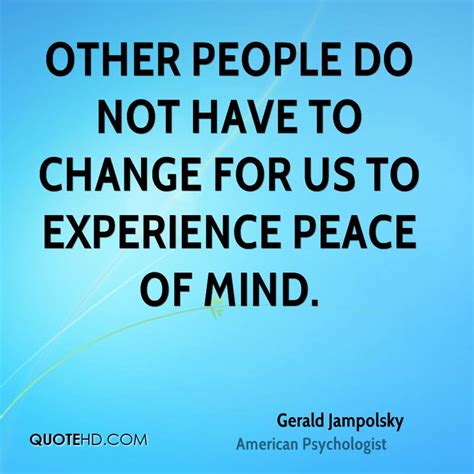A Quote by Gerry Spence
When we acknowledge the kingdom of the self, we will no longer accept slavery either for ourselves or for others, no matter how it is disguised.
Related Quotes
We have the need to be accepted and to be loved by others, but we cannot accept and love ourselves. The more self-love we have, the less we will experience self-abuse. Self-abuse comes from self-rejection, and self-rejection comes from having an image of what it means to be perfect and never measuring up to that ideal. Our image of perfection is the reason we reject ourselves the way we are, and why we don't accept others the way they are.
Slavery, you know, is nothing else than the unwilling labor of many. Therefore to get rid of slavery it is necessary that people should not wish to profit by the forced labor of others and should consider it a sin and a shame. But they go and abolish the external form of slavery and arrange so that one can no longer buy and sell slaves, and they imagine and assure themselves that slavery no longer exists, and do not see or wish to see that it does, because people still want and consider it good and right to exploit the labor of others.
We do not by any means think it desirable that the kingdom of righteousness and peace should be established on earth (because under any circumstances it would be the kingdom of the profoundest mediocrity and Chinaism); we rejoice in all men, who like ourselves love danger, war and adventure, who do not make compromises, nor let themselves be captured, conciliated and stunted; we count ourselves among the conquerors; we ponder over the need of a new order of things, even of a new slavery for every strengthening and elevation of the type "man" also involves a new form of slavery.
The act of self-denial seems to confer on us the right to be harsh and merciless toward others. The impression somehow prevails that the true believer, particularly the religious individual, is a humble person. The truth is that the surrendering and humbling of the self breed pride and arrogance. The true believer is apt to see himself as one of the chosen, the salt of the earth, a prince disguised in meekness, who is destined to inherit this earth and the kingdom of heaven, too. He who is not of his faith is evil; he who will not listen shall perish.
We would willingly have others perfect, and yet we amend not our own faults. We would have others severely corrected and will not be corrected ourselves. The large liberty of others displeases us, and yet we will not have our own desires denied us. We will have others kept under by strict laws, but in no sort will ourselves be restrained. And thus it appears how seldom we weigh our neighbor in the same balance with ourselves.
We have inherited a fear of memories of slavery. It is as if to remember and acknowledge slavery would amount to our being consumed by it. As a matter of fact, in the popular black imagination, it is easier for us to construct ourselves as children of Africa, as the sons and daughters of kings and queens, and thereby ignore the Middle Passage and centuries of enforced servitude in the Americas. Although some of us might indeed be the descendants of African royalty, most of us are probably descendants of their subjects, the daughters and sons of African peasants or workers.
Lao Tzu says: "Accept yourself. Non-acceptance is the root of all the trouble." None of us accept ourselves. The more a person doesn't accept himself, the greater a mahatma he looks to others to be. We are our greatest enemy. If we had our way, we would cut ourselves to pieces in order to remove what was unacceptable.




































